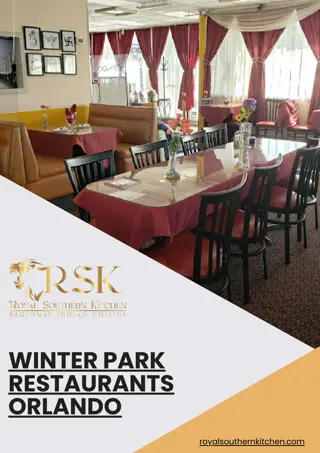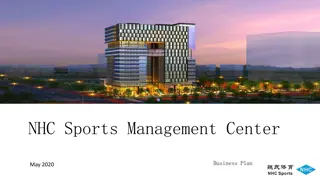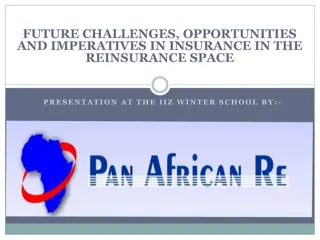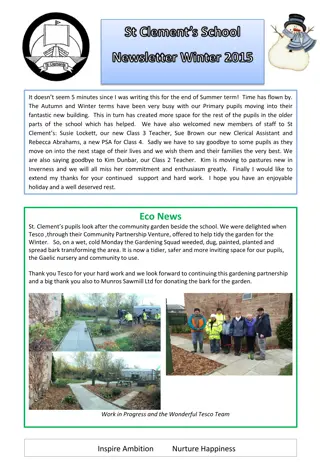IIZ WINTER SCHOOL CONFERENCE 2015
Customers in fragmented markets demand multiple approaches, leading companies to customize products and services while cultivating long-term relationships. Adapting to rising customer expectations and fierce competition requires new skills to serve global markets effectively.
Download Presentation

Please find below an Image/Link to download the presentation.
The content on the website is provided AS IS for your information and personal use only. It may not be sold, licensed, or shared on other websites without obtaining consent from the author.If you encounter any issues during the download, it is possible that the publisher has removed the file from their server.
You are allowed to download the files provided on this website for personal or commercial use, subject to the condition that they are used lawfully. All files are the property of their respective owners.
The content on the website is provided AS IS for your information and personal use only. It may not be sold, licensed, or shared on other websites without obtaining consent from the author.
E N D
Presentation Transcript
IIZ WINTER SCHOOL CONFERENCE 2015 ENTREPRENEURIAL SPACE IN THE INSURANCE SECTOR- A CORPORATE AND RISK MANAGEMENT PERSPECTIVE PRESENTED BY: SHINGIRAI SIKOMWE(0773744844) 25 AUGUST 2015; MONTCLAIR HOTEL & RESORT, NYANGA
One day all the employees reached the office and saw a big notice written on the door. Yesterday the person who has been stopping your growth in this company passed away. You are invited to join the funeral. In the beginning, they got sad for the death of one of their colleagues, but after a while they got curious to know who was the man who stopped their growth. Everyone thought: Well at least the man who stopped my progress died! One by one the thrilled employees got closer to the coffin, and when they looked inside they were speechless. They stood shocked in silence, as if someone had touched the deepest part of their soul. There was a MIRROR inside the coffin and everyone who looked inside themselves..There was a sign next to the mirror that read: FAILURES Failures common characteristics They they justify their failures and they blame..blame others everything have : complain, and could see
: There is only one person who is capable to set growth...It is YOU. You are the only person who can happiness, realisation..Your life does not change when your family, boss, friends or company change.....your life changes when you change...you go beyond your limiting beliefs and you realize you are the only one responsible for your life. Its the way you face life that makes the difference! If an egg is broken from outside force....life ends but if it is broken from inside force life begins. Great things always begin from our inside..You be the change, don't wish things were easy, Wish you were Stronger. limits to your influence success your and FAILURES Many failures people not close they were to success when they gave up Thomas Edison of life are did how who realise
THE EMBATTLED CORPORATION Customers Fragmented markets require companies to adopt multiple approaches to serve different target audiences Rapidly rising customer expectations force companies to customize their products, customer support function, and communication approaches, and yet do so in ways that can be standardized The costs of higher levels of customization require companies to cultivate longer-term customer relationships Sustainable growth means learning new skills in serving global markets
Competitors Competitors lead customers to entirely new market spaces, forcing companies to spend greater amounts on product development Aggressive competitors move quickly to mimic anything new attempted by the company, making it harder to differentiate the company in the eyes of customers Companies find themselves competing with companies in other industries that play by completely different rules-making current competitive approaches irrelevant Competitors specializing in narrow, profitable niches avoid costs of competing across a broader product and customer range, while attacking the company's most profitable areas of business
Technology Companies have to change the ways they operate internally and how they compete externally based on: New information management technologies New production and service delivery technologies New customer management technologies New logistics and inventory management technologies New sales force management technologies New product development technologies
Legal, Regulatory, and Ethical Standards Companies are increasingly accountable to multiple stakeholders, and their actions are more visible to these stakeholders, forcing management to make difficult choices and deliver results while behaving responsibly An increasingly litigious environment raises the stakes on company liability for products and how they are used; more lawsuits increase company costs and penalize innovative actions Regulatory restrictions limit choices while forcing companies to learn new ways to compete Growing affluence enables society to hold companies more responsible for the environmental and social implications of their actions
Developments in eight major domains of a company s external environment: Technological Environment Economic Environment Unpredictability of prices, costs, exchange rates, interest rates, tax incentives, business cycles and product cycles Accelerated development of new technologies; rapid Product obsolescence, greater difficulty in protecting intellectual property.
ENVIRON CONT Competitive Environment Labour environment Growing scarcity of skilled workers; employees more Aggressive take no prisoners competition; highly Innovative competitors; competition from non- traditional sources with non- traditional tactics; threats from niche players; competitors who are also customers or partners. mobile loyal; higher employee benefit costs; and less reliance on Contract labour.
ENVIRON CONT Customer Environment Resource Environment More demanding and complex customers; markets that are more fragmented and more narrowly segmented; emphasis on investing in and capturing a customer s life time value. Increasing resource scarcity; resources increasingly specialized; unknown sources of supply; more rapid resource obsolescence
ENVIRON CONT Legal and Regulatory Global Environment More aggressive regulation; virtually unlimited product liability; Environmental regulatory compliance costs, growing emphasis on free and fair trade; increasing environmental regulation and associated compliance costs; mandated employee benefits Real-time communication, production, and distribution Virtually anywhere in the world; more sophisticated suppliers, customers, and competitors located around the world; competitive advantage achieved through global outsourcing and international strategic alliances
Adaptability the ability to adjust, on timely basis, to new technologies, new customer needs, new regulatory rules, and other changes in conditions without losing focus or causing significant disruption of core operations and commitments The 5 Domains The quest for competitive advantage requires that the company and managers within continually reinvent themselves. Specifically, advantage derives from five key company capabilities. These include:
The 5 dormains cont Flexibility the ability to design company strategies, processes, operational approaches that can simultaneously meet the diverse and evolving requirements of customers, distributors, suppliers, financiers, regulators, and other key stakeholders. Speed the ability to act quickly on emerging opportunities to develop new products and services more rapidly, and to make critical operational decisions without lengthy deliberations.
The 5 dormains cont Aggressiveness an intense, focused and proactive approach to eliminating competitors, delighting customers, and growing employees; Innovativeness a continuous priority placed on developing and launching new products, services, processes, markets, and technologies, and on leading the marketplace
Categories of Organizational Constraints on Corporate Entrepreneurship Strategic Direction Policies and Procedures Systems Structures People Culture Misdirected Too many Absence of Long, complex Fear of failure ill-defined reward and hierarchical innovation goals approval cycles Resistance to values evaluation levels No formal Extensive change Lack of systems Overly narrow strategy for red-tape and Parochial bias "Turf" protection consensus Oppressive span of control entrepreneurship documentation over value (NIH control Responsibility No vision from requirements and norm SYNDROME) Complacency systems without the top Over-reliance on priorities Inflexible authority Lack of established rules Short-term Lack of fit of budgeting Top-down commitment of thumb orientation values with systems management from senior Unrealistic Inappropriate current Arbitrary cost Restricted executives performance skills and competitive allocation communication No entrepre- criteria talents for context systems channels neurial role managing Values that Overly rigid, Lack of models at entrepreneurial conflict with formal planning accountabi lity the top change innovative- systems for innovation ness, risk- taking, and proactive and change
RISK MANAGEMENT PERSPECTIVE In terms of risk management, the King Committee (2002, 98) states that the board is responsible for: Ensuring that processes and outcomes of key risk indicators are undertaken on an annual basis Appointing a board committee or an appointed dedicated committee that should review the risk management process and the significant risks facing the company Disclosing risk management in the annual report Ensuring that the internal audit function provides an independent assurance that the internal controls ensure effective risk management Ensuring that there is compliance with the applicable regulations
BYE LETS MAKE MONEY NOW!!!!!!!

 undefined
undefined






























